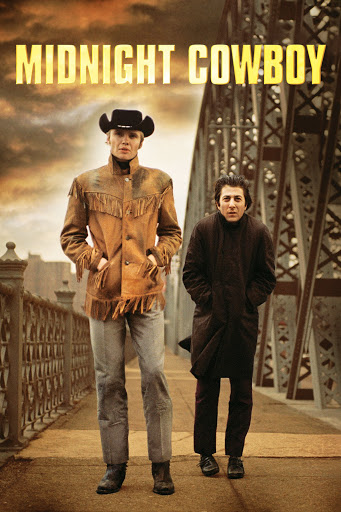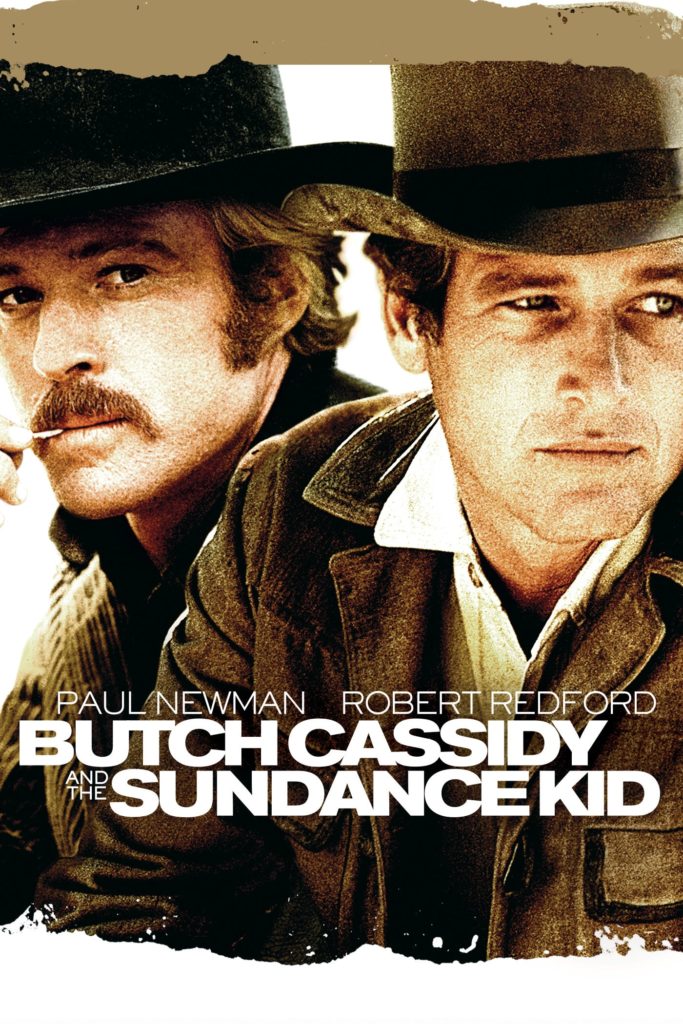1969
For over three decades the Hays Code enforced a rigid standard of behaviour, where cursing was forbidden, sex could only be hinted at between married people, interracial romance was off the table, and LGBT+ characters had to a) be subtle about it, and b) be evil and/or die. And so we’ve waded through four decades’ worth of Best Pictures held back by these rules. Movie stars were encouraged by the studio heads that ruled them to develop personas, not characters. Well, in the words of Oz from Buffy the Vampire Slayer…
Time’s up. Rules change.
So what do we have… the tragic lives of a hustler and his only friend, bank robbers getting gunned down in Bolivia, a deadly blow to the musical genre, and James Bond’s wife is murdered on her wedding day? And that’s not even touching the Sharon Tate thing.
Jesus, 1969, are you okay? Should I call someone?
And The Oscar Goes To…
A beefy Texan named Joe Buck (Jon Voight) decides to leave his small-town life and move to New York to be a hustler (aka male prostitute), figuring his chiselled cowboy self will be a refreshing treat to the east coast ladies (for reasons I choose not to share). He is… not good at it. After a rocky start, he befriends an ailing low-level thief named “Ratso” Rizzo (Dustin Hoffman), and the two struggle to survive on the uncaring streets of late 60s New York.
First off… “Wide eyed innocent comes to the big city to make their fortune, things go badly” is a common trope, but usually “becomes a street walker” is the consequence, something that happens when some predatory pimp hooks them on heroin, it’s not plan A. So that’s different. But it still follows the same arc as the standard story, where the protagonist’s dreams are harder than they thought and things go bad, only without the part where they meet the right people and turn things around.
Well they almost get there but Rizzo is very sick, they can’t afford doctors, and attempt to get to Florida.
Second… god how much do we miss give-a-shit Dustin Hoffman? I mean he’s still doing stuff, and Coasting Dustin Hoffman is still plenty fun to watch, but we must admit that once he had his two Oscars he decided to just have fun rather than go all out like he does here. Jon Voight is doing decent work (though I found myself struggling to root for Joe, because the times when he was broke were the only times he wasn’t chewing gum, including sex scenes), but Hoffman is acting circles around him as Rizzo. I mentioned this in the 30s, but young Hoffman was acting on a level your average Golden Age star didn’t even know was an option. (Except Lionel Barrymore, that dude came to play.) Also he didn’t become a right-wing tool the way Jon Voight did, thanks for that, Dustin.
Midnight Cowboy is the story of two broken souls trying to cling to existence by any method they can, and it makes for a gripping watch in places. The sequences blending fantasies and frenetic action with flashes of Joe’s past are fascinating in a way I’ve not seen in this project. Brief flashes and voice overs gradually shift over the movie from Joe’s memories of being told how special he was by relatives and one girlfriend to more disturbing flashes that, while brief, ultimately and effectively tell the story of one horrifying night that perhaps explains why moving to New York to have sex for money was Joe’s best career option.
A simple and very sad story elevated by some very impressive performances (and one burst of hysterics that somehow got Sylvia Miles an Oscar nomination?) that really broke ground on what New Hollywood could be. That said… the first big award darling about a sex worker, and Jon Voight is the lead? Feels like that time Hollywood decided to make a movie about sexual harassment, and Michael Douglas was the victim. Yeah, that’s how it usually goes, thanks.
I tweeted some thoughts because we’re still in Lockdown Two: Electric Avenue, so it’s not like I could just talk to a person or something.
And Rotten Tomatoes Says: They agree that it’s plenty unpleasant but too well-acted to ignore, and rank it 54th, right above Mrs. Miniver. I think it should be much higher than Mrs. Miniver but maybe Miniver is too high rather than Midnight Cowboy being too low?
What’s Good, Hays Code? One year after the Code ended and was replaced with the current ratings system, the X-rated Midnight Cowboy made over $20 million, coming in third at the box office, got seven Oscar nominations and won three, including Best Picture, all for an X-rated film about a sex worker. If you can think of a better way to dance on the grave of the Hays Code, I’d like to hear it
The Box Office Champ
Paul Newman and Robert Redford, everybody! Two solid performers we’re barely going to discuss because audience and Oscars have some blind spots!
Smooth talker Butch Cassidy (Newman) and skilled shooter the Sundance Kid (Redford, in a role he’d name his film festival after) run a band of outlaws that’s one of the west’s premier gangs. But infamy comes at a cost, and when things get too hot in America, Butch suggests they skip town and try doing crimes in Bolivia. It… doesn’t go great.
America is obsessed with its outlaws. Dillinger, Billy the Kid, Capone and the other prohibition gangsters, Bonnie and Clyde, true crime is perhaps the leading podcast genre, no doctor or firefighter or non-corrupt/bigoted civil servant will ever catch the public’s interest like a really interesting criminal. But Hays Code Hollywood made it a little tricky to make movies about outlaws, because glamourizing criminals was pretty staunchly anti-Code. I mean it happened. The original Scarface and White Heat come to mind. If nobody made movies about criminals, would James Cagney have been as big? Who knows. Anyway, it still seems to me that Bonnie and Clyde opened some doors, and Butch Cassidy and the Sundance Kid rode a bike through them to the tune of “Raindrops Keep Falling on My Head.”
And it’s a lot of fun. Butch bonding with an abnormally loyal railway employee? Funny. Showing a marshal trying and failing to round up a posse to catch Butch and Sundance then panning up to them watching it happen from a saloon balcony? Very funny. Sundance’s annoyance at Butch’s inability to rob banks in Spanish without a cheat sheet? Quite funny. Sure it’s not leading to a pleasant end (depending on how you weigh their odds against a division of the Bolivian army) but it’s a fun watch getting there. I like this one.
Good job, 60s, this was the best end-year I’ve had yet. And both films together were shorter than Gone With The Wind or Ben-Hur, that’s a plus.
And Rotten Tomatoes Says: 90% certified fresh, 90% from audiences, you’d probably like it too.
What’s Good, Hays Code? “Should we censor our content, Hays Code’s Head?”
“Uh, do whatever you want, I’m super dead.”
Other Events in Film
- This Year in Bond: Australian model George Lazenby takes on the lead role in On Her Majesty’s Secret Service. Bond fans will plead for you to forget the Lazenby of it all, insisting it’s one of the best, possibly because it’s one of the few to say “Hey what if James Bond had a character arc and emotional stakes, would that be neat?”
- Disney experimented with a live-action film about a sentient Volkswagen Beetle named Herbie in The Love Bug. It worked out for them.
- If anything were going to challenge Midnight Cowboy for “face of New Hollywood tackling taboo subjects,” surely it’s Easy Rider, clocking in at fourth at the box office.
- Hello Dolly comes in fifth but cost as much and made less than Cleopatra, so barely breaks even, putting the brakes on Hollywood’s fondness for musicals just like The Greatest Story Ever Told took the shine off bible epics. They didn’t make no musicals in the 70s, but… look Lindsay Ellis explains it better than I can right now.
- Bob & Carol & Ted & Alice is a movie about two couples having affairs and it’s not nearly the most sexually liberated movie this year so yeah, the levee done broke.
- Elvis Presley’s film career ends with Change of Habit, while Al Pacino’s starts with Me, Natalie, and that’s a solid trade-off.
- John Wayne beat Hoffman for Best Actor at the Oscars for True Grit, because “aging icon does new twist on his old archetype” is Oscar catnip.
- Very slightly ahead of True Grit in ticket sales was Paint Your Wagon, a western musical from Lerner and Lowe starring Lee Marvin and Clint Eastwood, and I cannot imagine it did the musical genre any favours. I imagine Paint Your Wagon wounded it, and Hello Dolly finished the job. Well… save for a few exceptions in the 70s. No genre ever really dies.
Next Page: The Wrap-up


